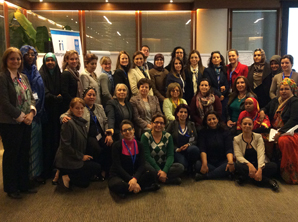Supporting women's equal participation in Constitution-Making

On Sunday, it is International Women’s Day, an important date to celebrate and reflect on the progress made in bringing about greater gender equality. For 2015, the day’s theme is “Empowering Women, Empowering Humanity.” Strongly committed to this, Interpeace is highlighting the work being done by its Constitution-making for Peace Programme.
Women’s Constitution-making Voices (WCMV) is a project launched by Interpeace’s Constitution-Making for Peace Programme (CMP) in collaboration with the United Nations Democracy Fund (UNDEF). It empowers women globally to fully participate at every stage and at every level of a constitution-making process - from building coalitions, engaging in civic education efforts to debating, adopting, drafting and implementing the constitution. Enabling women to build constitutions that promote gender equality and reflect women’s aspirations is another goal of the WCMV. The project will also document and share women’s vital contributions and experiences in building their constitution.
We live in an age of constitution-making. Since 1975 well over 200 new constitutions have been adopted, typically in response to conflict. Every year as many as 20 national constitutions are reformed or adopted, and another 20 or more constitutional reform processes are considered or initiated. Each of these constitutional processes represents an enormous opportunity to empower women to claim their political, social, economic and cultural rights. Moreover, if the constitution is made through an inclusive process, it is more likely to lead to a durable peace.
UN Security Council Resolution 1325 on Women, Peace and Security underscores that political transitions are critical moments to empower women. Constitution-making processes are an essential component of the roadmap to peace. The stakes are high. If women are supported during a constitution-making process they will be able to play larger roles in the political, social and economic life of their country after the adoption of the constitution. In short, each constitution-making process represents an enormous opportunity to advance the status of women but also carries a risk of losing hard fought for gains.
With these goals in mind, Interpeace and UNDP, with the support of the United Nations Democracy Fund et Swedish International Development Cooperation Agency, SIDA, jointly organized a workshop in Amman, Jordan on women’s full participation in constitution-making processes. Participants from Somalia, Yemen, Libya, Egypt, Jordan, Morocco, Tunisia and Iraq shared their experiences and lessons learned. They were able to talk with their peers about how to ensure women fully engage in the constitution-making process - including the critical role women are playing, often at great risk, to promote peace through constitution-making.
Making the role played by women visible
As one participant pointed out during the workshop: “The critical role that women play in constitution-making and peace processes is too often forgotten. Monuments and history only celebrate the men, whilst women are usually omitted from the historical records.” Another noted that she had become a citizen journalist because the media was ignoring issues that were central to women.
The women came from diverse backgrounds, including youth representatives. Some were part of civil society or the media, while others have worked with former or current official bodies involved in constitution- making or were members of the Arab Regional Network for Women’s Peace and Security Network (Karama).
Connecting women within their countries, across regions and globally
Reflecting on the workshop, participants particularly valued what they had learned from the experiences of women in similar situations. Hearing about the common challenges women face icreated enthusiasm about a global network that could support their efforts and foster learning. Everyone agreed on the need to share strategies about how women at the grassroots level can fully participate in constitution-making process and how to incorporate constitutional provisions that promote gender equality. As Michele Brandt, Director of the Interpeace’s Constitution-making for Peace Programme and the WCVM project explains: “It is hard to achieve constitutions that promote gender equality but it is even harder to implement those constitutional provisions.”
Empowering women in political transitions
The workshop highlighted how women can and should be equal participants in every task and at every phase of a constitution-making process to realize the goals of international efforts to empower women. “History has shown that when marginalized in the constitution-making process, women continue to be sidelined in the political life of the country. That’s why we need to carefully plan the full participation of women prior to the launch of a process,” explains Michele. “Women should not only be at the negotiation table, but also carry out civic education, public consultation, research, elections and other activities associated with the making of a constitution,” she adds.
This not only leads to a more durable peace but also more prosperous countries. Based on data drawn from numerous UN specialized agencies active in gender-related issues, the UNDP Gender Inequality Index indicates that countries where women play active roles in the political life of the country have a corresponding higher level of development.
